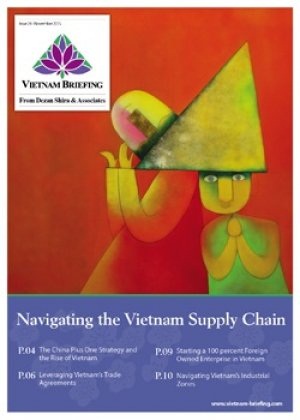Vietnam Regulatory Brief: Casino Ban Upheld, Dumping Duties on Plywood, and Uber Tax Requirements
Uber Required to Pay Tax
Vietnam’s Ministry of Finance (MoF) issued a new rule making it mandatory for Uber to pay taxes in the country. Uber will be required to pay taxes as a foreign establishment, which earns income in Vietnam without resident offices. The tax amount will be based on revenue multiplied with the tax rate, which is 3 percent for value added tax (VAT) and 2 percent for corporate income tax (CIT). The MoF has asked Uber to ask either its subsidiary or a third party to pay the relevant taxes. Drivers that have signed contracts with Uber will be required to pay tax on their income.
Uber drivers will be taxed at 3 percent for VAT and 1.5 percent for individual income tax. Uber entered Vietnam in June 2014 and has been able to avoid paying taxes till now. Its rival Grab is registered and has already been paying taxes.
 RELATED: Dezan Shira & Associates’ Tax Compliance Services
RELATED: Dezan Shira & Associates’ Tax Compliance Services
Dumping Tax Levied on Vietnamese Plywood
Vietnam’s plywood products will be subject to an anti-dumping tax imposed by Turkey at a rate of US$ 240 per cubic meter. The developments come after the Turkish Ministry of Economy (TMoE) launched an anti-dumping investigation into plywood imported from some countries, including Vietnam. Only two Vietnamese businesses won’t have the anti-dumping tax imposed on them, having furnished all the relevant information and proving that the exported timber products were manufactured by them.
The investigation goes back to May 2015 into specific HS coded products that were imported since 2010. Turkey is also planning to impose anti-dumping duties on polyester textured yarn from Vietnam. A final decision is expected in early October.
 RELATED: Customs Procedures in Vietnam
RELATED: Customs Procedures in Vietnam
Ban on Locals to Enter Casinos to Remain
Vietnam’s Ministry of Finance (MoF), in its latest draft decree, has barred locals from entering the country’s casinos. The MoF, which completed the draft in August, acknowledged the economic benefits of allowing locals to gamble, but remained hesitant on amending the rules. Only foreigners and Vietnamese with foreign passports are allowed to enter casinos. Analysts were hopeful that the ban on locals would be lifted as a request was submitted earlier this year. The hope was that the new government would consider making changes.
Reports indicate that 60 percent of the country’s population is under 35, and locals who do want to gamble, go to Hong Kong, Macau, and Cambodia. Studies show that locals spend around US$ 250 million every year in Cambodia’s casinos. The development is also a blow to international casino operators that are looking to invest in Vietnam. Analysts have stated that this may be detrimental to foreign investment in the sector. Las Vegas Sands has shown keen interest in the country but is likely to re-think its plans, considering that the government has not made any changes to the gambling law. Foreign investors require a minimum of US$ 4 billion in capital to run a casino, and are subject to 10 percent value added tax, 35 percent gross gaming revenue tax, and a 20 percent corporate income tax. The latest developments, however, bode well for casinos in neighboring countries, such as as Cambodia and Laos.
|
Asia Briefing Ltd. is a subsidiary of Dezan Shira & Associates. Dezan Shira is a specialist foreign direct investment practice, providing corporate establishment, business advisory, tax advisory and compliance, accounting, payroll, due diligence and financial review services to multinationals investing in China, Hong Kong, India, Vietnam, Singapore and the rest of ASEAN. For further information, please email vietnam@dezshira.com or visit www.dezshira.com. Stay up to date with the latest business and investment trends in Asia by subscribing to our complimentary update service featuring news, commentary and regulatory insight. |
![]()

Annual Audit and Compliance in Vietnam 2016
In this issue of Vietnam Briefing, we address pressing changes to audit procedures in 2016, and provide guidance on how to ensure that compliance tasks are completed in an efficient and effective manner. We highlight the continued convergence of VAS with IFRS, discuss the emergence of e-filing, and provide step-by-step instructions on audit and compliance procedures for Foreign Owned Enterprises (FOEs) as well as Representative Offices (ROs).
 Navigating the Vietnam Supply Chain
Navigating the Vietnam Supply Chain
In this edition of Vietnam Briefing, we discuss the advantages of the Vietnamese market over its regional competition and highlight where and how to implement successful investment projects. We examine tariff reduction schedules within the ACFTA and TPP, highlight considerations with regard to rules of origin, and outline the benefits of investing in Vietnam’s growing economic zones. Finally, we provide expert insight into the issues surrounding the creation of 100 percent Foreign Owned Enterprise in Vietnam.
 Tax, Accounting and Audit in Vietnam 2016 (2nd Edition)
Tax, Accounting and Audit in Vietnam 2016 (2nd Edition)
This edition of Tax, Accounting, and Audit in Vietnam, updated for 2016, offers a comprehensive overview of the major taxes foreign investors are likely to encounter when establishing or operating a business in Vietnam, as well as other tax-relevant obligations. This concise, detailed, yet pragmatic guide is ideal for CFOs, compliance officers and heads of accounting who must navigate Vietnam’s complex tax and accounting landscape in order to effectively manage and strategically plan their Vietnam operations.
- Previous Article Vietnam Releases Draft Safety Standards For Heavy Manufacturing
- Next Article Vietnam Regulatory Brief: Import Duty Exemptions, Foreign Contractor Licensing, and Cambodian Information exchange










